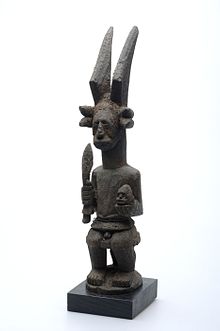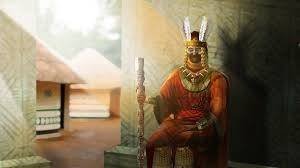What does Ikenga mean today to the modern Igbo people in Nigeria?
What does Ikenga mean today to the modern Igbo people in Nigeria?

I'm an African from Nigeria
LET us reason together:
For the Futurists, the two-horned beast is a yet unknown offspring of the devil who will declare war against Christians, perform dubious miracles and rule the entire world.
Both interpretations are wrong. The two-horned beast is neither Emperor Nero nor a devilish personality out to dominate the world.
In southeast Nigeria, there’s a masculine deity that confers success in farming, trading, hunting, blacksmithing, creative arts and procreation.
This deity is called Ikenga (pronounced ee-ken-ga). It is symbolized with a statuette of a two-horned warrior holding a sword in his right hand.
Ikenga
Ikenga was a warrior-king who fought against evil and injustice in ancient times. Estimates of the date of Ikenga’s reign range from 20,000 BC to 30, 000 BC.
After his death, Ikenga reincarnated in various cultures around the world to fight evil, ignorance and oppression.The last Ikenga incarnate was Eri, a sky-man who refined the Igbo calendar and founded Nri Kingdom in 900 A.D.

Eri
The next Ikenga will appear in late 2016 or early 2017
Because our African cultures (names, languages, beliefs and practices) are different from European cultures, the Europeans tagged most of our cultural practices, beliefs, and elements ‘pagan’ and devilish. Since this erroneous knowledge has been transmitted from generation to generation, today in Igbo land things are falling apart with brothers fighting against brothers in the name of God and religion. In this discourse, we shall look at the Igbo Christians and the idol-war currently going on in various parts of the Igbo land. We shall take idol to mean anything that is capable of menacing a people, that is, something that can endanger the welfare of a people or community. Idol can also mean a sculpture or moulded object of a spirit (Chi) which we can call a religious idol.
In contemporary Igbo society, there are a number of things which threaten the welfare and life of many people in society. These include corruption, deception and selfishness of the political class, daily intimidation and extortion of the already impoverished bus-drivers and Banye-transport riders (Keke) by different Nigerian law-enforcement agents, deception and robbery in God’s name by different ‘Men of God’, embezzlement of the Church’s money by various ministers of religion, establishment of fake Miracle Churches where gullible people are hoodwinked and robbed of their money by ‘Men of God’ (some even have private helicopters), cheating, calumny, lying, envy, wickedness and glaring acts of injustice by different ranks of Christians and their religious ministers. All the above come under what I call social destructive idols.
Under religious idols, we have spirits with various names according to geography, such as Udo, Ọgba, Ikenga, Idemmili, Amadiọgha, Ogwugwu etc. Contrary to the views of most Christians, for the Igbo native religion theologians, these (small) spirits are spirit-servants of Chi-ukwu (Chukwu), the Great Spirit. For Igbo ancestors, they are simply spirits and God’s agents and not gods Only Chukwu is both Spirit and God (Onye-okike). The ‘idols’ (images) which represent these spirits are mere representations or symbols of them and nothing more, as a picture of one’s mother is simply a picture/representation of her and not one’s mother. Why are Christians from various parts of Igbo society investing so much time, human and material resources waging war against religious idols? There seems to be two explanations for this.
It is today being aggressively fought against by those Igbo Christians who, like the Europeans, see most of the Igbo cultural practices and symbols as things that relate to the devil. People who care to know would observe that the relationship between Igbo Christians and their non-Christian brothers and sisters, who they call 'pagans', is getting sour day by day. Incidents of some innocent priests and pastors being beaten and assaulted in different parts of Igbo land are manifestations of this unhealthy relationship.
Priests and pastors are seen today as enemies or symbols of opposition to Igbo culture and native religion because of what some Christians are doing. It has been noted that the Nanka ugly incident of 1993 when two Catholics were shot dead and many others wounded would not have taken place if 'fanatical charismatic members did not whip up sentiments against' the tradition of the people which forbade a wife to see the corpse of her husband. 'In their case, the Word was made flesh in order to uproot us all from our culture and environment.'
As some have observed, the amount of hatred and rancour that is being generated against the Church and Christianity today by the behaviour of our new generation 'missionaries' could erupt any day into violence of Nanka proportion.' All this reminds one of the wisdom Chinua Achebe expressed in Things Fall Apart and the truth embedded in it:
The white man is very clever. He came quietly and peaceably with his religion. We were amused at his foolishness and allowed him to stay. Now he has won our brothers, and our clan can no longer act like one. He has put a knife on the things that held us together and we have fallen apart.
Yes, we have fallen apart; opposing, hating, fighting and maiming our own brothers even for things we may not claim epistemological certainty. Has the white man, for instance, not succeeded in dividing the community or Umunna into Ndi-uka (Church people) and Ndi-obodo (citizens) as Ndi-uka (Igbo Christians) no longer see themselves, or accept that they are also Ndi-obodo? Not every Christian shares this view and many are not happy with the way their fellow Christians treat with scorn the Igbo native religion and simple Igbo traditional practices that are not even religious practices. One Okwu Epuechi, himself a Catholic Christian, in a speech titled The Beginning of Liberation from Mental Slavery, lamented as follows: Some Christians and their leaders are attacking our traditional institutions from different facets; either they are fighting to stop our traditional rites of marriage or they are fighting to stop our methods of rites of passage for the deceased or even fighting to stop us using our traditional week/market days of Eke, Orie, Afá» na Nkwá». Some are even forced or persuaded to the delusion of changing their surnames into Israeli, Latin or English names as such Igbo names, we are told by these ministers of God, connote evil. What a delusion; this is the height of mental slavery. It is not only obnoxious; it is very, very absurd and unfortunate
Hi! I am a robot. I just upvoted you! I found similar content that readers might be interested in:
https://www.quora.com/What-does-Ikenga-mean-today-to-the-modern-Igbo-people-in-Nigeria